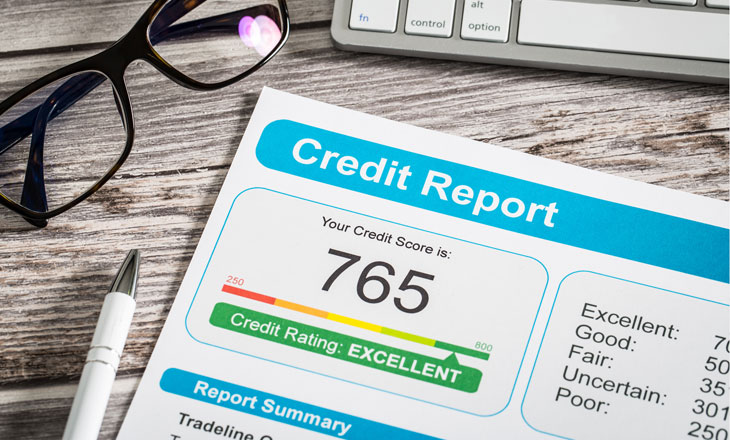Not a Member? Join us today!
It's easy to join! Apply for your lifetime Membership with iTHINK Financial in about 10 minutes.
MEET WITH US ON YOUR TIME
Schedule an in-branch or phone appointment at a time convenient for you.
Featured Products
You can turn to iTHINK Financial for the right solutions to all of your financial needs!
Managing Credit: 5 Ways to Improve Your Credit Score and Manage Debt
By: iTHINK Financial | May 07, 2021

The average credit score in the United States is 711. This
score falls within the 'good' category. But a credit score of 711 isn't fantastic, considering that the highest score is 850.
When it comes to managing credit scores, there is always room for improvement. However, many people don't know
where to start. In fact, one in five adults in the United States doesn’t have a credit score at all.
If you're feeling lost, don't worry. Here are five strategies that will increase your credit score.
Pay Everything on Time
We're going to start with one of the most important strategies to building credit. FICO and VantageScore, the two top credit scoring companies, place the most importance on the timeliness of your payments. If you're even one day late on a payment, it
stays on your credit report for seven years.
At the very least, you should pay the minimum amount required for each bill. This habit will keep your credit score from dropping.
Although, paying the minimum can get complicated. It may increase your revolving credit, which can
eventually lower your credit score. We'll talk more about this later.
How to Pay Your Bills on Time
The real question is how to pay your bills on time. We could tell you to pay them, but that's easier said than done.
Life gets busy. Bills pile up. Money gets tight.
In fact, not paying bills on time is one of the common financial mistakes. So, here are some tips that you can use when your bills are due:
- Make a list of all of your bills and their amounts for each month (as you get the statements)
- Mark the payment due dates on your calendar
- Incorporate each bill into your monthly budget
- Set up automatic payments whenever possible
- Consider asking for a grace period or later due date
Overall, being organized is the key to getting everything paid on time. However, you also have to have the money.
Strategically Paying Bills
If you're struggling to pay your bills, you may need a more strategic payment system. This means that you need to match each bill with a paycheck. And, you need to know when you're paying each bill.
It may sound not very easy, but all you need
to do is follow these steps:
- Mark each day that you receive a paycheck from your job(s)
- Estimate how much money you're going to receive with each paycheck
- Choose which recurrent bills should align with each paycheck
- Devote the money you receive with each paycheck to their corresponding bills
For example, let's say that you get paid twice a month. For the sake of this example, we'll say that those two paydays fall on the 15th and the 30th.
In a perfect situation, you should assign bills from the 30th of the previous month to the
14th of the following month to the paycheck you receive on the 30th. Likewise, you could assign every bill from the 15th to the 29th to the paycheck you receive on the 15th.
However, this could vary depending on how much you receive each
paycheck and how expensive each bill is.
You want to take the time to allocate each paycheck to their corresponding bills. Don't forget to account for your emergency savings, retirement savings, and other accounts.
Limit Your Credit Use
Another way to contribute to improving your credit score is by using less credit. This strategy may sound counter-intuitive, but it proves a few things to your lender:
- You are capable of paying for some items with other forms of payment, such as cash or debit
- You don't need to use as much credit to make purchases
- You can pay off your lines of credit as you use them
Using more credit doesn't make your score higher. Keeping your credit usage low actually improves your credit score. So you can use your lines of credit, but you should be careful not to overdo it.
Some credit-savvy individuals choose to use
their credit cards for specific purchases. For example, they only use their credit card for gas or only for groceries. Any other purchases go through their debit card. By designating certain purchases to each card, you're going to feel better about
staying within your credit limit.
How Much Credit You Should Use
In general, we recommend that you should use less than 30% of your available credit. This rule of
thumb applies to all lines of credit.
The amount of credit that you're using is the second-biggest factor in calculating your credit score. Thus, you should be constantly aware of how much of your credit you're using.
While it
would be best to keep your credit usage under 30%, you can give and take a little if you need to devote some of your credit to larger purchases. Going over this 30% mark won't drastically damage your credit score, but it will affect it negatively,
so try not to exceed it unless it is an emergency.
Going Over Your Credit Limit
Now, let's talk about going over your credit limit. Hopefully, you never have to think about going over your credit limit. But, sometimes, situations get desperate.
In these situations, we urge you to talk to your credit lender. Most credit
companies have procedures set in place for individuals who fall under financial hardship.
You may be able to set up a payment plan or even increase your credit limit.
If given a choice, we highly recommend that you increase your
credit limit. Assuming that you won't use all of your credit, a higher credit limit will decrease the percentage of the credit that you're using, thereby increasing your credit score.
If you go over your credit limit, it could hurt your
relationship with the credit company and damage your credit score.
Many credit companies have systems in place to reject purchases that go over your existing limit. However, if a purchase does put you over your credit limit, this will lower
your credit score. For the most part, it hurts your credit score because you're taking up more than 100% of your credit limit for that one line of credit.
Control Your Debt
If you have a high debt-to-income ratio, it's time to take control of it. While credit bureaus may not be able to see
every single dollar of debt that you have, they can see the debt that you have towards your credit accounts.
This visibility means that credit card debt, loan debt, and the like show on your credit report.
Debt doesn't have to
be a bad thing. Responsibly using debt can increase your credit score.
For example, let's say that you've taken out student loans.
Technically, the sum of all of these loans is the amount of debt that you owe (not including other forms of debt that you may have).
If you don't pay these loans off, it looks bad on your credit report and decreases your credit score. However,
this kind of debt can increase your credit score if you steadily pay it off over time.
Debt Over Time
Another essential factor to take into account is the amount of time you have held debt. With every long-term source of credit, you're likely to have monthly payment dates.
As long as you pay the agreed amount on these dates, the debt will not
hurt your credit score. To clarify, this means that large amounts of debt cannot affect your credit score as long as you follow the contract that you signed.
However, this does not work the same with debt like credit card debt.
Credit cards are a form of revolving credit. This type of debt means that you'll owe interest on the remaining balance at the end of the period. This interest adds to your existing balance and increases the amount of your available credit that you're
using.
Thus, your credit score could decrease as a result, even if you pay the minimum payment.
Vary Your Accounts Responsibly
You may have heard the phrase, "Don't put all of your eggs in one basket." This saying applies to credit, too.
Having multiple credit accounts may seem like a bad thing, but anything is good in moderation.
Having multiple accounts
can show lenders that you're capable of handling various lines of credit at once. And, if you're able to keep credit usage low on all of these accounts, your credit score will rise.
We encourage you to vary your accounts. You can have multiple
credit cards, a car loan, and more. However, you shouldn't add too much at once.
If you add too many new lines of credit within a short amount of time, your credit score will drop. This drop is because the credit bureaus will see these
new lines of credit as a cry for financial help. Even if you keep well below the 30% limit, you could still see a drop in your credit score.
Applying for Credit
To prevent lowering your credit score, you should apply for new credit slowly. This strategy means that you may want to stick with one credit card for now. Then, in a year, you can consider adding another one.
Six months after that, you may
want to apply for a car loan.
But, if you try to do all these things at once, your credit score will drop.
We should also
note that you shouldn't apply to too many lenders at once. You may want to get offers from multiple lenders, but each lender will pull a credit report. The more credit reports that people pull from your account, the lower your credit score will be.
Therefore, we recommend that you knock your choices down to two or three lenders before receiving offers. With this, you should make sure that you haven't had any credit inquiries within the several months before applying for a new line of
credit.
Learning More About Managing Credit
Everyone needs to learn about managing credit. No one is immune to the importance of a credit score.
Remember: pay everything on time, limit how much credit you use, pay off your debts, apply for several types of credit, and never give up on
your score.
If you're looking for a bank that will help you take care of your money and improve your credit score, consider joining iTHINK Financial.
Upcoming Events
Check out the upcoming events happening at iTHINK Financial.
Quick Pay and Skip-A-Pay
Make a loan payment or skip your upcoming loan payment without logging in to Online Banking!





